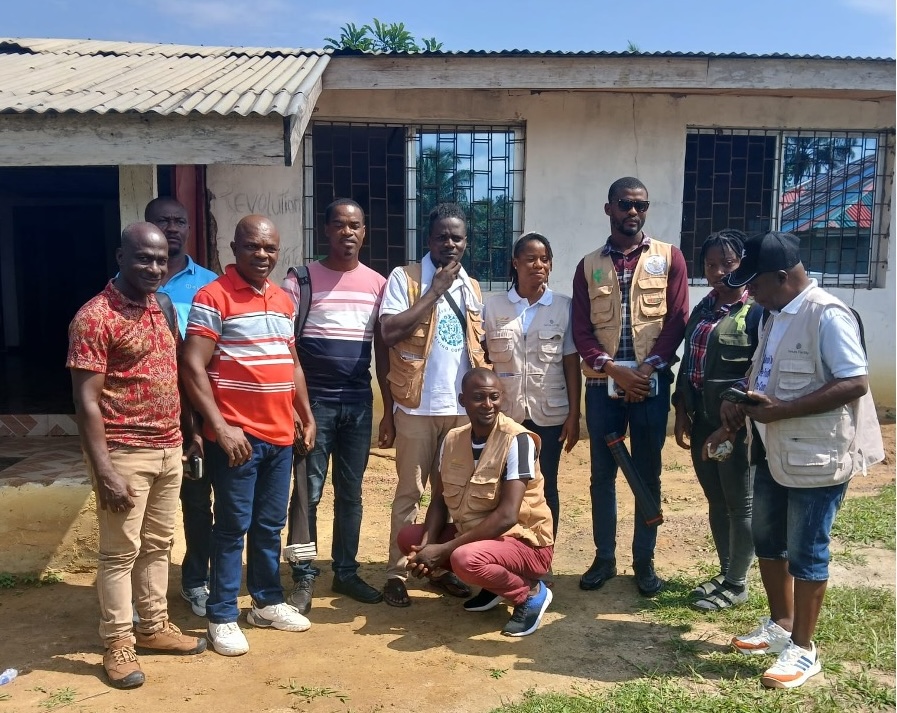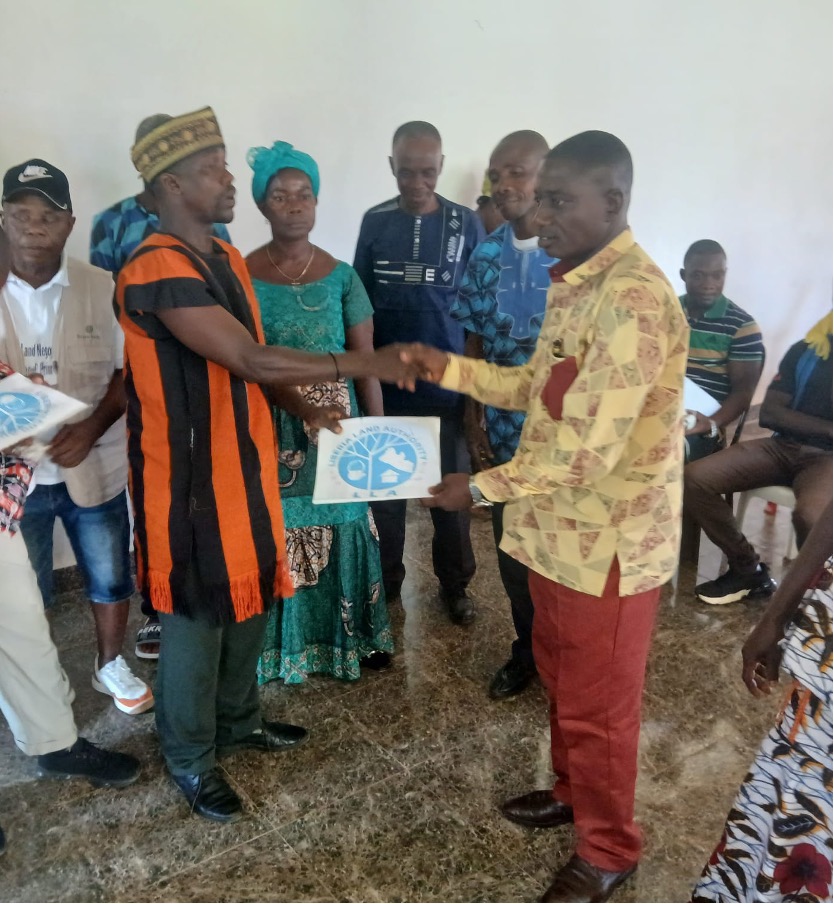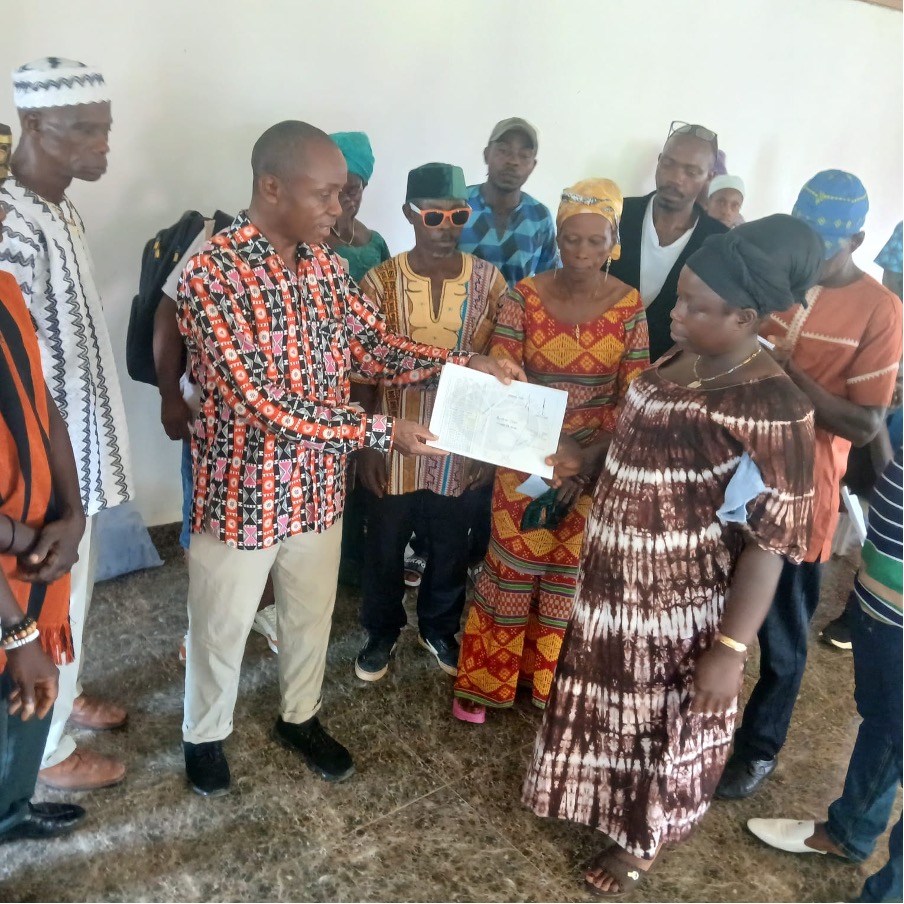RIVERCESS – In a significant development for land rights and community empowerment in Liberia, the Sustainable Development Institute (SDI) and the Government of Liberia, through the Liberia Land Authority, presented Customary Land Deeds to four traditional communities: Teekpeh, Ziadue, Dorbor, and Gbarsaw. This historic moment, which took place on Tuesday, December 10, 2024, in Yarpah Town, Central River Cess District, marks a key step in the ongoing efforts to formalize land tenure rights, enhance local governance, and resolve long-standing disputes over land ownership in the country.
The presentation of these land deeds is part of a broader collaboration between the Tenure Facility, SDI, the Forum for Community Initiatives (FCI), and Parley. Together, these partners are working to support local communities in formalizing their land and forest tenure rights as part of Liberia’s commitment to land reform and sustainable development.

A joint effort by the Sustainable Development Institute (SDI), the Government of Liberia, and international partners, including the Tenure Facility, Forum for Community Initiatives (FCI), and Parley: Photo By Eric Opa Doue.
The Role of the Liberia Land Rights Act (2018)
The Liberia Land Rights Act (LRA), passed in 2018, established a framework for land governance in Liberia, with an emphasis on the recognition of customary land rights. This landmark legislation provides a legal basis for local communities to secure ownership and control over their land. Arthur Cassell, SDI’s GIS Specialist, highlighted the importance of community-based land administration under the LRA, stating:
“This initiative, leveraging community-based land administration competencies established in the Liberia Land Rights Act (2018), will demonstrate procedures for enhancing women’s land and property rights that can be scaled up throughout Liberia.”
Cassell believes by formalizing land ownership and governance structures, the LRA seeks to provide legal certainty for communities while also fostering greater protection of land and forest resources.
Challenges and Progress in the Communities
The road to formalizing land rights for these four clans has not been without its challenges. Decades of land disputes, conflicting claims, and unclear ownership had left many communities in a state of uncertainty. The process of obtaining these land deeds involved overcoming these conflicts, often requiring negotiations and compromises between neighboring communities.
Tetoe Davis, the head of the Community Land Development Management Committee of Dorbor, expressed the emotional weight of the process:
“The struggles we passed through to reach this far, I’m happy, “said Davis. “We went through a lot of things, but today, we reached this milestone.”

River Cess’ Land Administrator, Borbor Y. Boyon presents title deed to the Traditional Chief for onward transmission to the CLDMC: Photo by Eric Opa Doue.
Indeed, the progress made by these communities is a testament to their resilience and determination. In some cases, land disputes were resolved through concessions. For example, Gbarsaw and Dorbor had a boundary dispute over a parcel of farmland. The conflict was eventually settled when Dorbor agreed to waive its rights to the land in favor of Gbarsaw. Similarly, a protracted dispute over the ownership of Sand Beach Junction, a contested area claimed by three of the four clans, was finally resolved when Ziadue and Dorbor surrendered their claims to Teekpeh.
While such agreements were necessary to bring peace, they also highlight the importance of effective land governance and dispute resolution mechanisms in strengthening community cohesion and ensuring equitable land distribution.
Women’s Empowerment and Land Rights
One of the key aspects of this land reform initiative is its focus on enhancing women’s land and property rights. For many years, women in Liberia have faced significant challenges in accessing and controlling land. By including women in the land formalization process and recognizing their rights, these initiatives are paving the way for more inclusive and equitable land governance.
Arthur Cassell pointed out that the community-based land administration model can play a crucial role in improving women’s rights to land, ensuring that they have a greater say in decisions about land use, ownership, and governance.
“This initiative will demonstrate procedures for enhancing women’s land and property rights that can be scaled up throughout Liberia,” he said.
The Customary Land Deeds: A Symbol of Empowerment
The presentation of the Customary Land Deeds to the four communities is a powerful symbol of empowerment. For the traditional chiefs and leaders, it represents a profound shift in the power dynamics between the government and the communities. Nancy Gbarpue, a traditional chief from Dorbor, expressed the significance of the land deeds:
“The land for us now. First, it was for the Government, but now it’s for us,” said Madam Nancy. “We will protect it. We get power now, and anything we say is the final.”
This shift in control over land resources is particularly important for the clans involved, as it strengthens their ability to make decisions related to their land and forest resources, without external interference. The recognition of customary land rights enhances community self-governance and fosters a greater sense of ownership over local resources.

Nancy Garpue, a traditional chief from Dorbor receives the deed on behalf of her community: Photo by Eric Opa Doue.
Land Area and Demographics of the Four Communities
The four communities involved in this initiative occupy a significant portion of Liberia’s landmass in Central River Cess District. Together, they manage approximately 143,000 hectares of land, each community with its own distinctive territorial boundaries:
Teekpeh Clan: With 60,000 hectares, Teekpeh is the largest of the four clans, and its territory spans a significant portion of the region.
Gbarsaw Clan: The smallest of the four, Gbarsaw covers 18,000 hectares.
Ziadue Clan: Ziadue occupies 33,000 hectares, balancing the land distribution between the four communities.
Dorbor Clan: Dorbor, with 32,000 hectares, sits at the heart of this land reform initiative.
The formalization of their land rights not only protects the natural resources within these areas but also supports sustainable land management practices that benefit future generations.
Looking Ahead: Scaling the Model
The success of this initiative is an encouraging step for land reform in Liberia, but the work is far from over. As Arthur Cassell notes, this project aims to serve as a model for broader land reform efforts across the country. By demonstrating effective community-based land administration, Liberia can expand these practices to other regions, enhancing land tenure security, and ensuring that more communities have a voice in managing their land and natural resources.
Furthermore, the involvement of women in land governance and the emphasis on dispute resolution provide a framework that can be adapted and scaled to other parts of Liberia, contributing to the broader goals of sustainable development, social justice, and community empowerment.
The presentation of Customary Land Deeds to the four communities of Teekpeh, Ziadue, Dorbor, and Gbarsaw in Yarpah Town, Central River Cess District, marks a significant achievement in Liberia’s land reform process. Through collaboration between local communities, the Liberia Land Authority, and international partners, these clans have secured their land rights, resolved longstanding conflicts, and set an example for other communities across the country.
The next steps will focus on scaling this initiative, empowering women, and fostering sustainable land management practices. As these communities move forward, they are not only protecting their land but also ensuring a brighter, more equitable future for their children and generations to come, according to Cassell.
With more than 143,000 hectares now officially under the control of local communities, the hope is that this move will lay the foundation for sustainable land management practices, protect local ecosystems, and reduce conflict over land in the years to come.









Discussion about this post